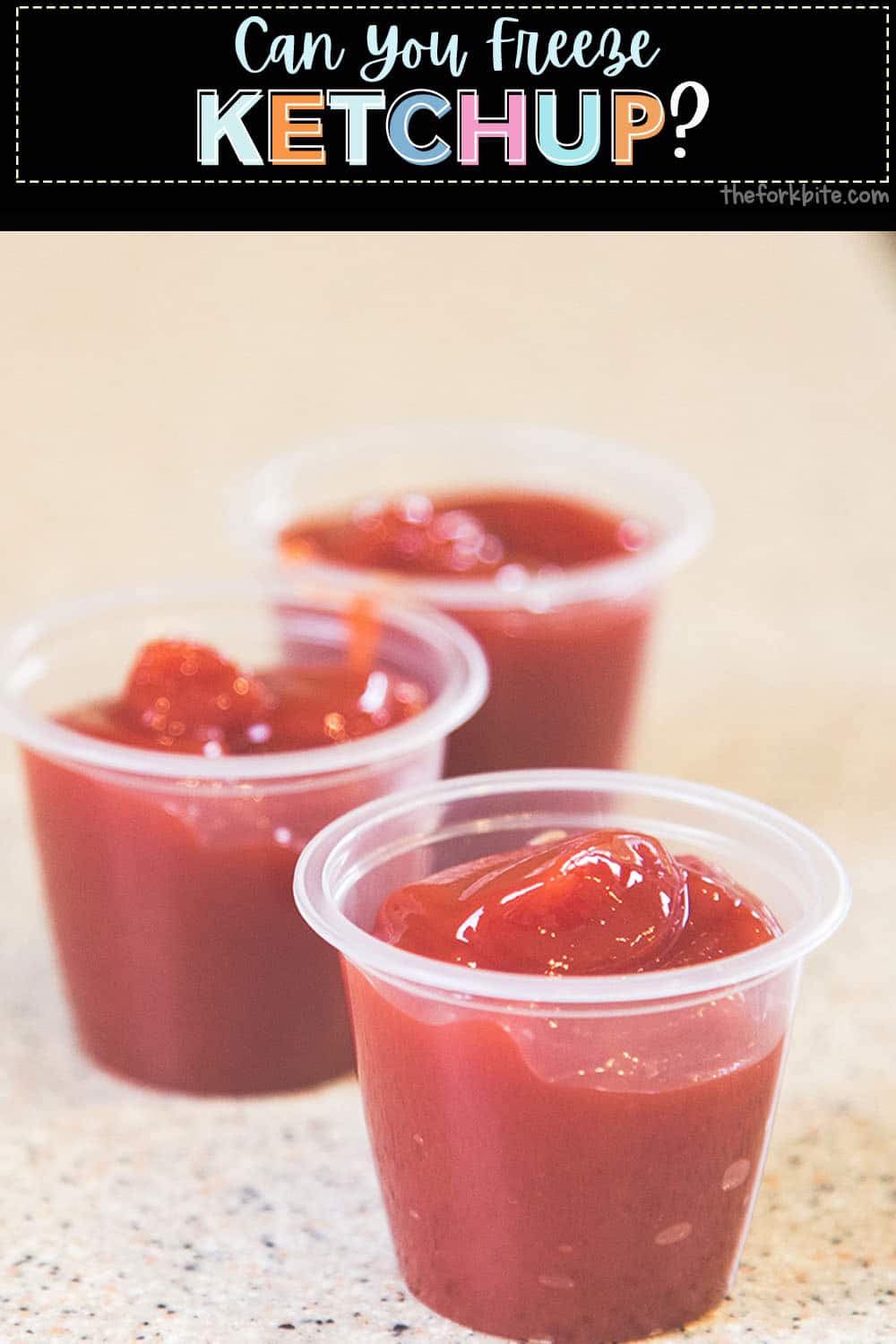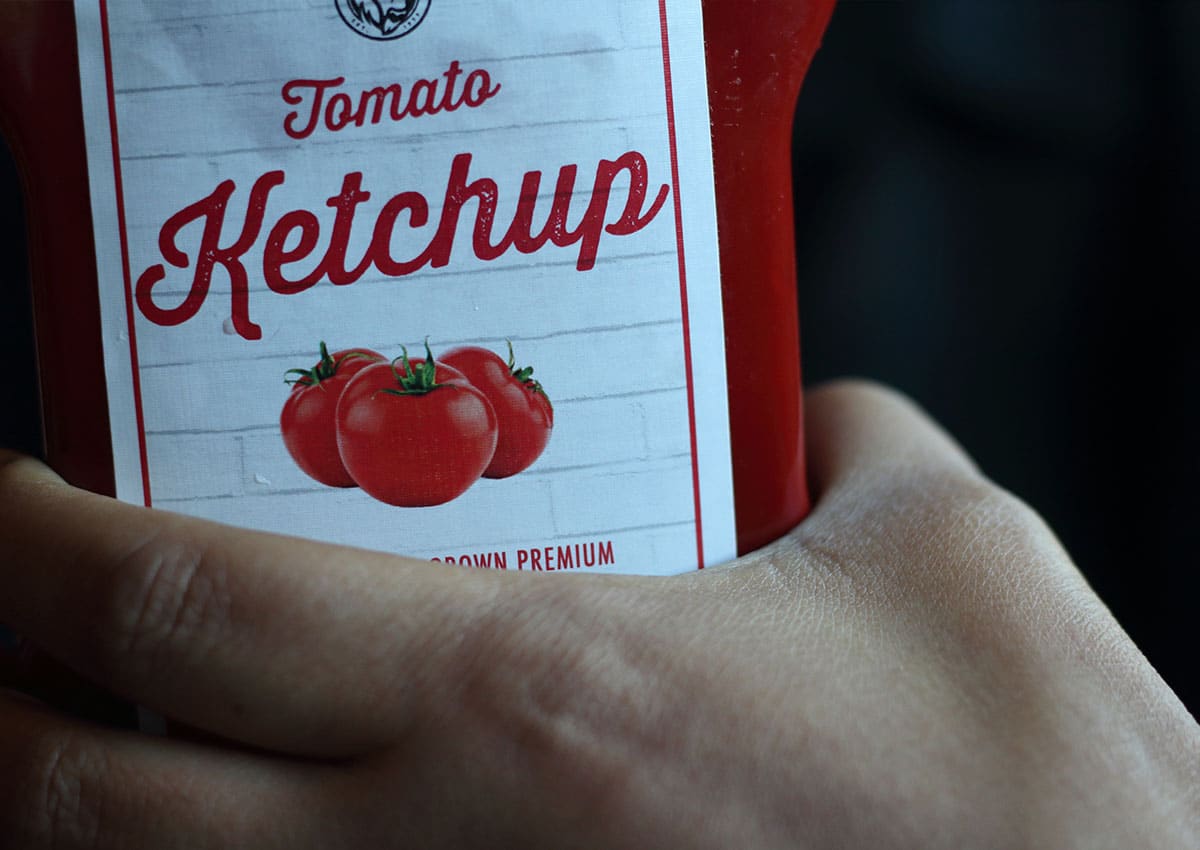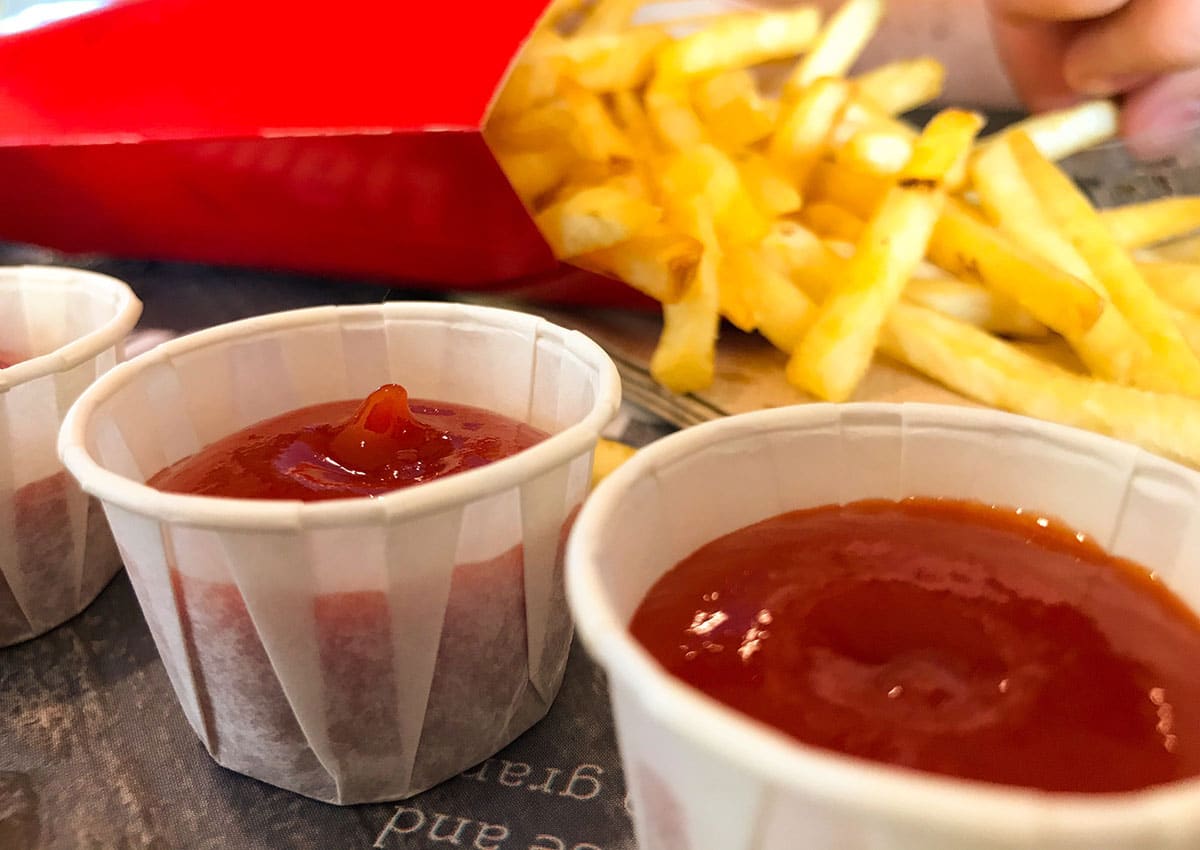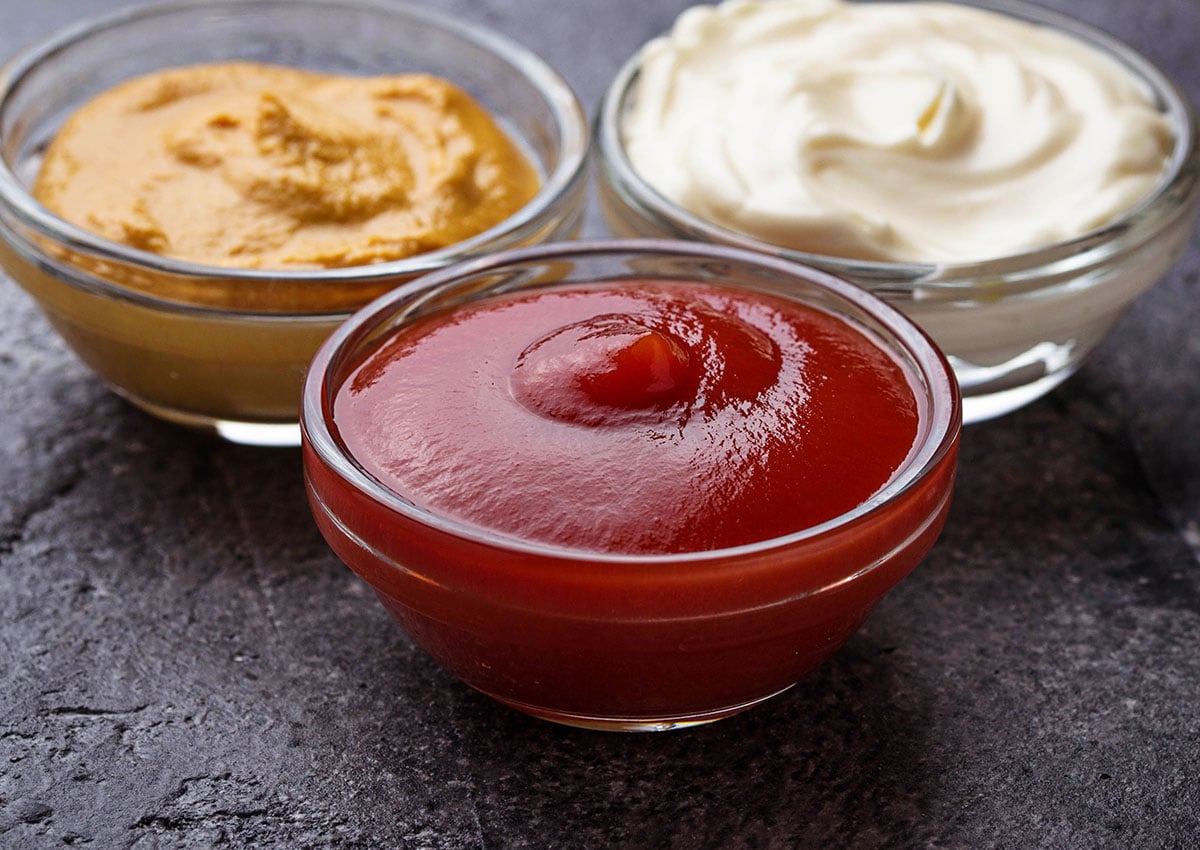You may or may not know this, but tomato ketchup freezes brilliantly well at very low temperatures.
Ketchup has an exceptionally long shelf life anyway, but you can lengthen it considerably when it's getting close to its expiration date by freezing it.
How we use ketchup
Although you can add it to recipes when you are creating dishes, ketchup is most commonly used as a condiment with dishes that have already been prepared.
One of its base ingredients is vinegar which is naturally resistant to the growth of bacteria. It's partly this that makes ketchup store so well at room temperature.
The history of ketchup
Close to 100% of Americans keep a bottle of ketchup in their kitchens.
With such an incredible statistic, one wouldn't blame you for thinking that ketchup was invented here in the US.
However, that is far from the truth as ketchup, or ke-tsiap (which comes from Hokkien Chinese word) as it was originally called, has its roots in Asian cuisine. [source: national geographic]
The first written record of ke-tsiap (whose name means pickled fish sauce) was discovered in China around 544 CE.
From there, it's found its way to North America via the Dutch in the 1600s and ships bearing the English flag.
Come the middle of the 18th century, ketchup became a British staple, but it was quite different from the ketchup we know and love today.
Ketchup came to North America via the rush of immigrants, and it was in the late 1700s when fishermen from New England came up with a new ingredient.
It was a plant they had discovered in their travels in the South - that plant was, of course, the tomato.
As ketchup took on its new red color, different original tart and tasty sauce variations began to appear all over - all sporting the new ingredient - tomato.
In 1876, F&J Heinz introduced their tomato-based ketchup to a waiting population.
And the classic tomato ketchup we all adore today hit the food shelves and kitchens here in the US.
Can you freeze ketchup?
I already gave the game away in my opening statement, so you already know that yes, you can freeze ketchup, as can many tomato-based products.
- You can freeze it in a sealed bottle, transfer it to a different airtight container, or freeze it in small portion-sized cubes in your fridge's ice cube tray.
The vast majority of products made from tomatoes can be frozen easily, so it comes as no surprise to know that you can safely freeze ketchup for an almost indefinite period.
More importantly, it doesn't lose any of its unique flavor characteristics, having been frozen.
Read: Easy Homemade Tater Tots Recipe
Reasons for freezing ketchup vary from household to household.
Some people who like to take advantage of great price offers at cash and carries will buy ketchup safe in the knowledge you can freeze it for many months, years even, and still taste good when thawed.
Then some people use it in such little amounts that they prefer to portion it into smaller servings (as with ice-cube size portions) and freeze it to take it out as and when needed.
Even if the consistency deteriorates a little as it thaws, it's no great problem to reconstitute it with a quick stir.
If you are thinking of freezing ketchup, and this is your first time, you might appreciate a step-by-step set of instructions.
Freezing ketchup step-by-step
As you might be having frozen ketchup in your freezer for a considerable time, it's important to make sure that you pack it appropriately.
Top tip:
- It's not a good idea to freeze plastic bottles of ketchup, especially when they're full. Don't forget that it has high water content.
- Freezing it will cause it to expand and could easily split the bottle.
- Ketchup that has been transferred to a plastic jug can be put into the freezer without further preparation.
- If you are freezing ice cube-type portions of ketchup, put them onto an ice shaper plate or silicone tray.
Step 1
Transfer the ketchup into the tray or plate and try to fill the compartments evenly.
Only fill approximately halfway. Remember that water content. Leave sufficient room for the ketchup to expand as it freezes.
Step 2
Once you have filled the tray to the appropriate depth, give it a quick and gentle shake to even and level everything up.
Then wrap in cling film and store flat in your freezer.
Step 3
Wait for an hour or two to allow the ketchup to become solidly frozen.
Step 4
The final stage is to transfer the frozen cubes of ketchup into an airtight, freezer-safe container.
Resealable freezer bags are the perfect tool for the job.
Step 5
Label and date. The great thing about freezing ketchup in small portion sizes is that rather than taking the whole thing out and thawing it, after which refreezing it would be inadvisable, you can take out and defrost just what as you need.
How to Defrost frozen ketchup
Step 1
Take as much ketchup as you want to defrost out of your freezer and transfer it onto your kitchen counter.
As an alternative, you can store it overnight in your refrigerator.
If you froze the ketchup into ice cube-type shapes, you can take out as many as you need and put them into a small bowl.
Step 2
Leave for an hour or two until thoroughly defrosted.
A word to the wise - When you defrost frozen ketchup, the likelihood is that it will become quite runny. Don't worry; this is quite normal.
Step 3
If you find that the ketchup has separated, all you need to do is to give it a brief stir to reconstitute it, and it will be as good as new.
What happens to ketchup when it freezes?
Because ketchup contains a lot of water, it freezes like ice. As it thaws, the ingredients begin to isolate, and the consistency changes.
It is no longer at the same as it would be from a newly opened bottle.
However, it's not the end of the world, as all you have to do is blend it to re-adjust the consistency.
Why it is that ketchup freezes so well
Due to its high water content, ketchup freezes nicely in the freezer. But when you are freezing it, it's essential to use a freezer-safe storage container.
If you prefer to use plastic bags to freeze your ketchup, you need to make sure that the bags you use are also freezer-safe.
If you don't, you will probably find they will tear, or in the case of a container that is not freezer-safe, it will crack as it freezes.
Why freeze ketchup?
Whoever is reading this article, I bet that you have almost certainly got a bottle of ketchup in your fridge or pantry.
It's become such a staple here in the States, and it's a huge favorite with children that it's almost a given.
This sauce has such a remarkably extended shelf life that it will still be safe to consume, regardless of how long it is that you've been storing it.
Because of this, it is unlikely that you would ever even think about freezing it just to extend its shelf life.
But nonetheless, there are some people out there who rarely ever consume ketchup.
It's left lying in their fridge for ages, which brings up the possibility that it may have spoiled.
Buying ketchup in bulk and freezing it
If you're one of these people who regularly keeps an eye open for great deals in your local supermarket, you might be open to considering buying ketchup in bulk when it's on special offer.
So the following is good news.
- An unopened can or bottle of ketchup will be good for up to 2 years in your pantry.
- After opening, a bottle of ketchup should be okay for up to 12 months in your fridge.
So if you're buying in bulk to take advantage of a lucrative deal, you might want to consider freezing the majority for use in several years.
Thawed frozen ketchup - the consistency change
Ketchup is so easy to freeze because it contains a high volume of water that behaves like ice when it freezes. It does not cause any problems when it is frozen.
The problem materializes when the ketchup defrosts. Because of all that water content when frozen ketchup thaws, it becomes thinner than originally when fresh.
If it's too watery, dunking things like chicken nuggets are a no-no.
Ketchup is vulnerable to freezer burn, and if it happens, it will ruin the taste of the sauce. All the time you spent preparing it for freezing will have been to no avail.
Precaution:
Also, there's something else you need to bear in mind. Whatever you do, don't put an unopened glass bottle of ketchup into your freezer.
Because as the ketchup freezes, it will expand and destroy the bottle leaving a mess to clean up and danger from broken glass.
But it's not all bad news.
According to this article, You can leave an opened bottle of ketchup in your fridge for as long as six months.
That's not all. Thanks to its vinegar ingredient, you can keep an unopened bottle of ketchup for up to 2 years past its use-by date.
It means there is probably not any real need to freeze it in the first place.
How long does ketchup last in your freezer?
As long as it is stored correctly, frozen ketchup will be safe in your freezer for up to 2 years.
It can last even well beyond this point, providing your freezer temperature remain constant and the ketchup is in a continually frozen state.
As with any frozen food, ketchup can be subject to freezer burn.
The longer it is in your freezer, the greater the chance that air will find its way into the container causing this type of damage.
Read:
- How Long Does Cocktail Sauce Last?
- Reheating Meatloaf without Drying
Does frozen ketchup turn bad?
Yes, frozen ketchup can go off - especially under these circumstances:
- If kept for a very long time in a freezer.
- If it's allowed too long to thaw.
If ketchup is left out to thaw for a long time, this can result in it going bad.
It would be best if you kept an eye on it as it thaws and when it has defrosted.
If it's not going to be used straight away, transfer it to your refrigerator, where it can be kept safe for many weeks.
But don't leave the ketchup open to the air, even though it is inside your fridge.
Transfer it either into an airtight container or a resealable plastic bag.
Continued exposure to the atmosphere will harden it because the moisture it contains will evaporate.
Is it safe to refreeze ketchup?
Providing it hasn't thawed out completely, it's only safe to refreeze frozen ketchup.
You need to bear in mind that ketchup is a tomato-based product.
So, when it thaws, there is always the risk it could become contaminated by bacteria that thrive when left at a warm temperature.
It is the reason that you should not thaw ketchup at room temperature.
The other recommendation is that if you got defrosted ketchup that has been left out at room temperature for more than 20 minutes, you should not refreeze it.
The rules to follow when freezing any food
Preserving is popular right now. Almost everywhere you look, you'll come across a jar of some Artisan pickle or jelly made from some exotic berries you've never seen before.
But before going to all of that hassle in terms of preserving and pickling, the easiest way of preserving fresh food is probably already at hand right there in your kitchen. It's the freezer.
The basic principles of freezing are pretty straightforward.
Chuck it into the freezer, wait for a while, take it out, defrost it, and eat it. But it's not always that simple.
Here are a few ground rules to try and observe:
Rule 1
Under no circumstances should you freeze food in glass jars without ascertaining first that they are freezer safe.
If the glass in question has not been tempered, there is a serious risk that it will shatter - an even bigger risk if you're freezing a liquid that expands as it freezes - like water.
The safest thing to do is to use Tupperware or freezer bags as an alternative.
Rule 2
Keep a large bag available in which to store scraps. When you have any kale stems leftover or pieces of carrot etc., throw them into your bag, and once it's full, you can make a lovely stock with it.
Rule 3
Don't use hot water to defrost food. It doesn't matter whether we're talking about tomato sauce, a piece of steak, some frozen chicken soup, or a clump of parsley.
There is a danger that you will part cook the frozen food, and this will change its texture and taste in unexpected ways.
Rule 4
Think about temperature. As far as food safety is concerned, food should drop to temperatures of:
- 120°F to 70°F inside two hours
- 70°F to 45°F inside four hours
In other words, don't leave your pasta sauce out overnight to allow it to cool - even though it hasn't got any meat in it. It's not good practice and could make someone ill.
Top tips on condiment storage
The old ice cube tray trick has got a lot going for it.
However, I have to say I find it rather hard work - all that portioning and freezing and coaxing out and transferring it into resealable bags. It's quite a rigmarole.
What I tend to do is to freeze my condiments and sauces in small snack-size freezer bags. It's nice and easy and means I can take out what I want when I need it.
How long will they last?
They should last easily for between three and four months.
Defrosting them for recipes
The great thing about freezing sauces and condiments in small quantities is that you can transfer them straight into your recipe without worrying about defrosting them first.
This is when using small freezer bags comes into its own. Just snap off what you need and throw it straight into your recipe as it cooks.
When it comes to freezing pesto, I like to do it in a single thin layer - thin enough so that it can be snapped off and folded straight into my bowl of pasta.
Bear in mind:
Mayonnaise won't freeze well. No types of emulsified oil-based condiments can be frozen. They will break and separate and won't look anything like they should. They're not fit to eat when thawed.
Are ketchup packets freezable?
Another query that arises quite often is whether or not it is safe to throw ketchup bottles or ketchup in packets into the freezer.
On several occasions, I've already mentioned that liquid foodstuffs tend to expand as they freeze.
With ketchup having a high moisture content, we can expect the same behavior, which is indeed what happens.
So dealing with the bottle packaging first, even if you leave enough air inside it to allow the ketchup to expand, I still recommend not to freeze it in this way.
Not only is there the breakage problem to consider, but there is also the reality that getting frozen ketchup out of the bottle is always going to be pretty tricky.
And of course, if you defrost the whole thing, you shouldn't then freeze it again, so you're in danger of wasting any leftovers.
You could always consider transferring the ketchup into a large glass jar such as a Mason jar.
Providing you leave enough room for expansion, this type of glassware will keep your ketchup safe from freezer burn.
How to tell if ketchup has gone off.
Although I have stated on several occasions throughout this article that ketchup can last indefinitely when stored properly, there is always the possibility that it can spoil.
Nine times out of ten, the cause is poor storage.
Although it is implausible that ketchup will go off to the extent that it could be harmful and perhaps lead to a severe incidence of food poisoning, both its flavor and its aroma can decay, which will render it inedible.
The signs that indicate your ketchup could have turned include:
- When it separates
- When watery liquid gathers on the surface
- When the color changes from its usual bright red to a darker maroon
- When the consistency becomes too thick
Although, as just mentioned, off ketchup is unlikely to cause serious health problems, it's good practice from a food hygiene perspective to dispose of it.
Can you consume ketchup after its expiry date?
The date that you will see on the label of the ketchup bottle is not its expiry date. It's more like a best-by date which is there for quality reasons.
It is usually quite safe to use ketchup well after this date as long as it has been correctly stored.
But just to be sure. If your ketchup does exhibit any of the signs listed above indicating it may have gone off, I recommend that you should bin it.
For how long is ketchup good after its expiry date?
There's no foolproof answer to this question. It depends on many things - mostly how well it has been stored and whether or not it has been opened.
However, it should remain safe to use for at least six months and possibly even for years if the bottle hasn't been opened.









